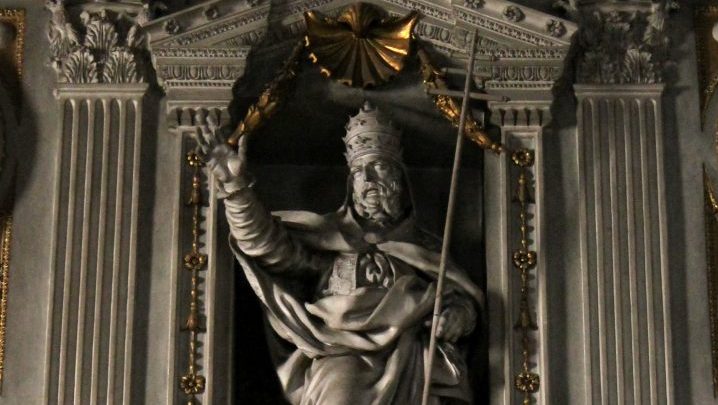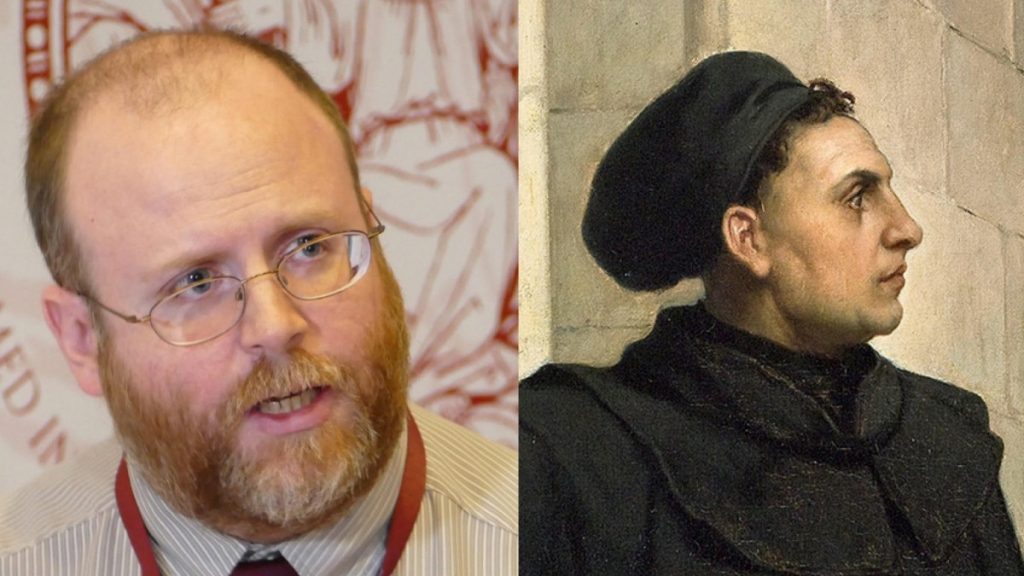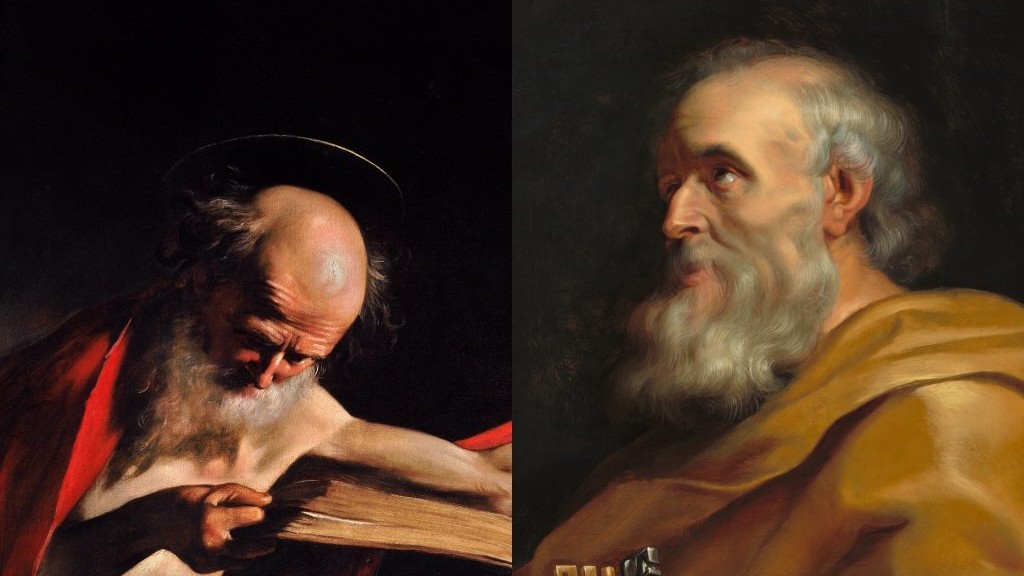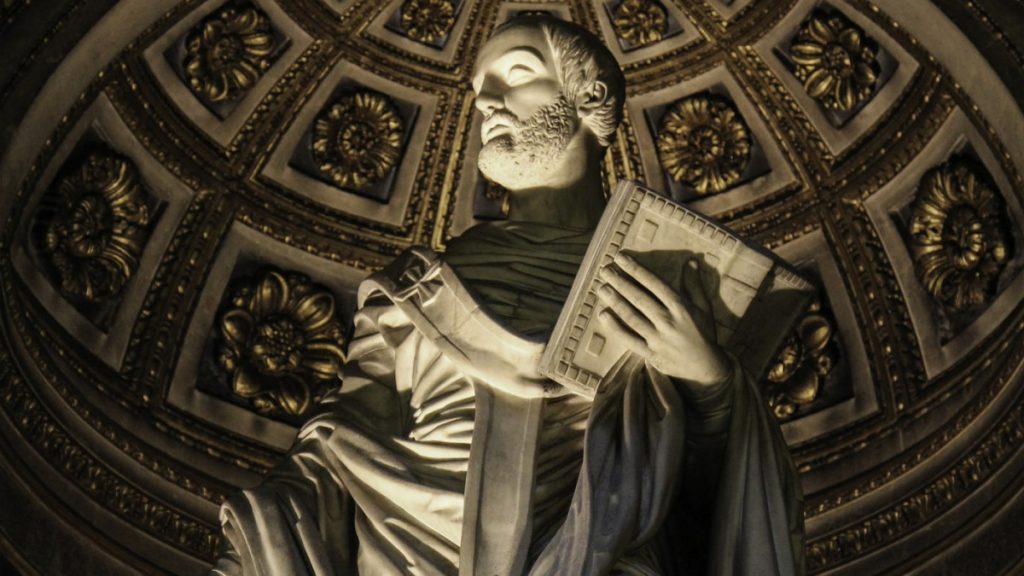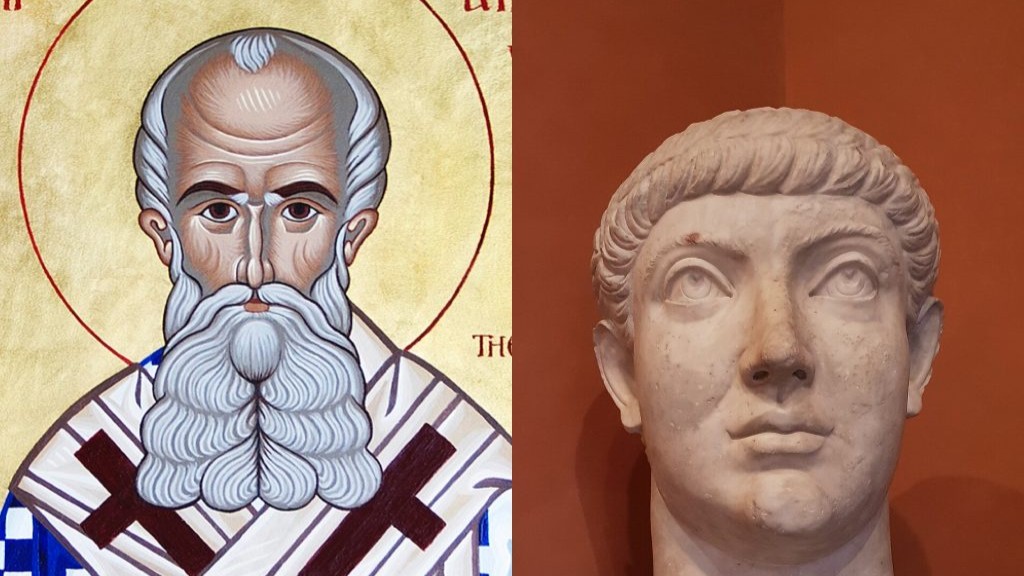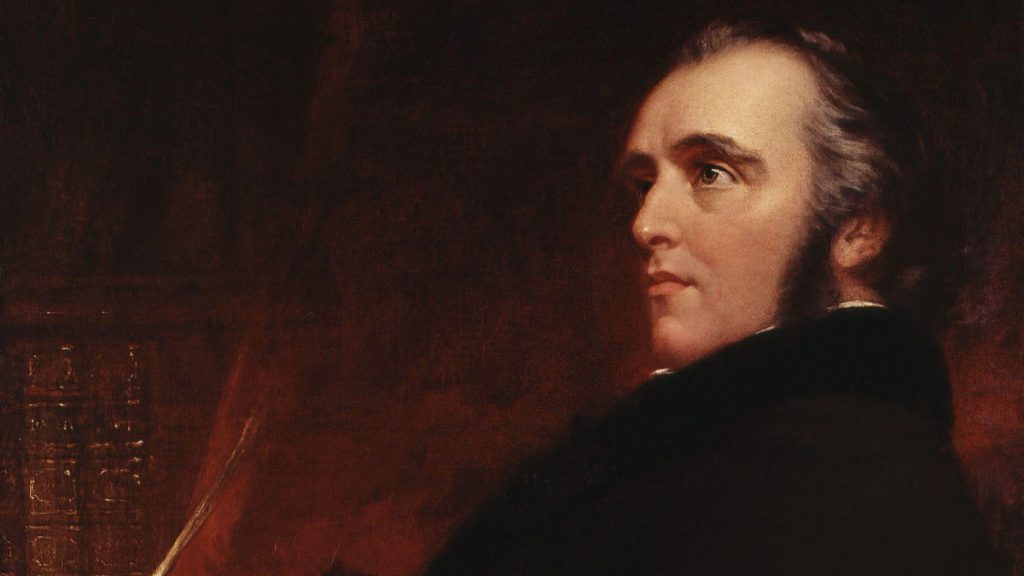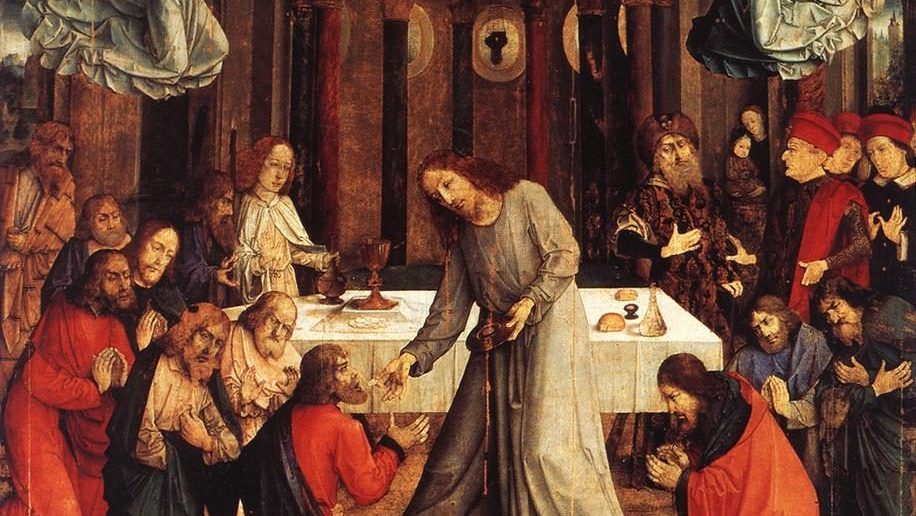(Updated July 13, 2025)
This Author Quote Archive collects pertinent quotes from the Church Father, St. Pope Innocent I.
Next to each quote are the Topic Quote Archives in which they are included.
This Quote Archive is being continuously updated as research continues. Quotes marked with “***” have not yet been organized into their respective Topic Quote Archives.
Letters
St. Pope Innocent I, Letter “Etsi tibi, frater”: To Victricius, Bishop of Rouen (February 15, 404)
(§§1, 2)1 ***
(§1) [We have sent] this book of regulations to be carefully introduced to neighboring peoples and bishops as a model…
(§2) [T]hat with the aid of the holy Apostle Peter, through whom both apostolate and episcopate in Christ took their beginning [the Church should be presented unto God] without spot or wrinkle.
St. Pope Innocent I, Letter “Consulenti tibi”: To Bishop Exsuperius of Toulouse (February 20, 405)
(§7)2
A brief addition shows what books really are received in the canon. These are the desiderata of which you wished to be informed verbally:
Of Moses, five books, that is, of Genesis, of Exodus, of Leviticus, of Numbers, of Deuteronomy, and of Joshua one book, of Judges one book, of Kings four books [two books of Samuel, two books of Kings], and also Ruth, of the prophets sixteen books, of Solomon five books [Proverbs, Ecclesiastes, Song of Songs, Wisdom, Sirach], the Psalms.
Likewise of the histories: Job one book, of Tobit one book, Esther one, Judith one, of the Maccabees two, of Esdras two [Ezra one, Nehemiah one], of Chronicles two books.
St. Pope Innocent I, Letter to Decentius, Bishop of Gubbio (March 19, 416)
Since your love prompts you to seek advice on this as on other matters, my son Celestine the deacon also mentioned in his letter that Your Excellency had put up for discussion the text in the epistle of St. James the Apostle: “If anyone among you is sick, let him call the presbyters, and let them pray over him, anointing him with oil in the name of the Lord. And the prayer of faith will save the sick man, and the Lord will restore him, and if he has sinned, He will forgive him” (Jas. 5:14). There is no doubt that this ought 322 | 323 to be understood of the faithful who are sick and who can be anointed with the holy oil of chrism which is prepared by a bishop. It is not just priests but all as Christians who may be anointed with this oil when it is necessary for themselves or their families. However, it seems to Us that an idle point is raised when doubt is expressed in the case of a bishop about something that is certainly permitted to priests. For the very reason that it was assigned to priests is that bishops are burdened with other business and are not able to go to all the sick. However, if a bishop is able or thinks someone worthy of a visit from him, then he, whose duty it is to prepare the chrism, can without any hesitation bless and anoint the sick with chrism. But the chrism cannot be poured on those doing penance because this is one of the sacraments. How is it conceivable that one sacrament can be granted to a person to whom the rest of the sacraments are denied?
St. Pope Innocent I, Letter 29 (181 in St. Augustine): To St. Augustine and the Bishops of the Council of Carthage (January 27, 417)4
In your inquiries into the things of God, which require to be treated by priests with great care, especially when there is question of a true, just, and Catholic council, you have kept the precedents of ancient tradition, being mindful of ecclesiastical discipline, and you have added strength to our religion, not only now in your council, but before it when you made your pronouncement according to right reason, and when you voted to submit the matter to our judgment, knowing well what is owing to the Apostolic See, since all of us who are placed in this position desire to follow the Apostle himself, from whom the very episcopate and the whole authority of its name are derived [St. Peter]. Following in his footsteps, we know equally how to condemn what is evil and to approve what is praiseworthy, as for example, the fact that you keep the customs of the fathers with priestly zeal, that you do not think they should be trampled underfoot. Because it has been decreed by a divine, not a human, authority that whenever action is taken in any of the provinces, however distant or remote, it should not be brought to a conclusion before it comes to the knowledge of this See [Rome], so that every just decision may be affirmed by our complete authority. Thus, just as all waters come forth from their natural source and flow through all parts of the world, keeping the purity of their source, so all the other Churches may draw from this source knowledge of what they are to teach, whom they are to absolve, and 121 | 122 from whom the waters, intended only for pure bodies, should be withheld as being soiled with indelible filth.
Therefore, I thank you, dearest brothers, for sending us letters by our brother and fellow priest, Julius, in which you show that while administering the Churches of the whole world, in union with all, you ask a decree that may be for the good of all. Thus, a Church, supported by its own rules and strengthened by the decretals of a legitimate pronouncement, may not have to be exposed to those against whom it should be on guard: men instructed or, rather, destroyed by the perverse subtleties of words, who pretend to argue for the Catholic faith yet breathe out deadly poison so as to corrupt the hearts of right-thinking men and drag them down, seeking to overthrow the whole system of true dogma…
Therefore, this poison is to be cut out, which, like a sore, has crept into a clean and wholly sound body, let if it is removed too late it may settle in the very vitals from which it may not be possible for the corruption of this evil to be drawn off… 122 | 125
Therefore, whoever appears to be in agreement with this statement which declares that we have no need of divine help [Pelagianism] shows himself an enemy of the Catholic faith, and an ingrate to the goodness of God. They are unworthy of our communion, which they have polluted by such preaching. They have voluntarily fled from the true religion by following those who make these statements. Since this whole matter rests on our avowal, and we accomplish nothing by our daily prayer except in so far as we receive the grace of God, how can we tolerate such boasting?…They must be plucked out and removed far 125 | 126 from the bosom of the Church, lest their error, gaining ground for a long time, should afterwards grow in to something incurable. If they were to remain long unpunished they must needs draw many into their perverted state of mind, and deceive the innocent or, rather, the unwary who now follow the Catholic faith, who will think the deceivers must be right since they see them remaining in the Church…
Therefore, let the diseased sore be cut off from the sound body, and the miasma of the cruel malady be carefully removed, that thus the healthy parts may continue to live, that the flock, being cleansed, may be clear of this contagion of an infected flock. Let there be an unspotted perfection of the whole body, such as we know, from your pronouncement against them, that you follow and hold, and which we, together with you, uphold with equal assent…
But this answer, furnished with abundant examples of our law, is sufficient to meet your warning, and we think that nothing remains for us to say.
St. Pope Innocent I, Letter 30 (182 in St. Augustine): To Silvanus, Valentine, and the Bishops of the Synod of Milevis (January 27, 417)5 ***
In the midst of our other cares for the Church at Rome and the duties of the Apostolic See, in the course of which we examine decrees on various subjects with faithful and curative argument, our brother and fellow priest, Julius, brought the letter of your Charity which you sent, in your close devotion to the faith, from the Council of Milevis, and, without my knowing it, he included the report of the Synod of Carthage, adding this document of similar protest. Truly the Church rejoices that her pastors display such watchful care for the flocks entrusted to them, not only that they do 127 | 128 not allow any to go astray, but, if the harm of herbage on the left entices any of the sheep and they persist in wandering away, they decide either to cut them off entirely, or to watch them with all the old-time care when they unlawfully disregard warnings; on guard against both extremes, lest, if they refuse the strays, others may be led away by a like example; if they cast them off at their return, they may seem to have been devoured by the teeth of wolves. Their plan of action is always prudent and full of Catholic faith. For, who could either show indulgence to an erring soul or fail to welcome him back at his conversion? As I think it is a sign of hardness to treat sinners with connivance, so I judge that it is wicked to refuse a helping hand to the converted.
You show diligence and consideration in taking thought of the apostolic honor, of that concealed honor, I mean, of him whom “besides those things which are without, the solicitude for all the churches” (2 Cor. 11:28) weighed down; and in asking what opinion is to be held on anxious matters, following in that form of the ancient rule, which you know has always been upheld by me throughout the whole world…In particular, I think that as often as an argument of the faith is being blown about, all our brothers and fellow bishops ought to refer it solely to Peter, that is, to the one having the authority of his name and rank, as your Charity has now done, so that it may be for the common benefit of all the Churches. They must be the more on guard when they see the originators of evil cut off from communion with the Church by the enactments of our decree, in consequences of the report from a twofold synod [Carthage and Milevis].
Therefore, your Charity will perform a doubly good action, 128 | 129 for you will gain gratitude for preserving the canons of belief, and the whole world will share in the common good conferred by you. Are there any Catholic men who would be willing to join conversation hereafter with the adversaries of Christ? Would anyone want to share the common light of life with them? Surely, the authors of a new heresy should be shunned. What more bitter attack could they imagine against the Lord than to take away the reason for daily prayer, after having nullified divine assistance?… 129 | 130
That other doctrine which your Fraternity claims that they preach, that little children can attain the reward of eternal life without the grace of baptism, is very foolish. For, unless they eat of the flesh of the Son of man and drink His blood they will not have life in them [John 6:54]. Those who claim this for them without regeneration seem to me to wish to nullify baptism, since they teach that these children have what they believe is not to be bestowed on them in baptism even by themselves. If, then, they do not wish anything to stand in their way, let them confess that there is no need of rebirth and that the sacred stream of regeneration has no effect. But in order to disarm the vicious doctrine of vain men by the swift reasoning of truth, the Lord proclaims this in the Gospel by saying: “Suffer the little children and forbid them not to come to me” (Matt. 19:4; Mark 10:14; Luke 18:16). Therefore, concerning Pelagius and 130 | 131 Caelestius, that is, the originators of new dogmas, which, as the Apostle says, are of no profit, but tend to beget utterly vain questions, we decree, relying on the strength of apostolic authority, that they are to be deprived of communion with the Church until “they recover themselves from the snares of the Devil, by whom they are held captives at his will” (2 Tim. 2:14, 23, 26); that they are not to be received within the Lord’s flock which they have chosen to forsake by following the path of a crooked way. “Those who trouble us, who would pervert the gospel of Christ” (Gal. 1:7, 5:12), are to be cut off. We likewise prescribe that if any strive to defend this teaching with similar obstinacy, they are to be bound under the same censures, “and not only they that do these things but also that consent to them that do them” (Rom. 1:32), because I think there is not much difference between the intention of him that does something and the consent of him that agrees to it. I add more: When no one assents to the errant one he generally unlearns his error. Therefore, beloved brothers, let the aforementioned decisions stand as a fixed decree; let them be kept out of the house of the Lord; let them at least be prevented from exercising any pastoral care, lest the deadly contagion of two sheep creep in among the unwary flock, and the greedy-hearted wolf rejoice that so many flocks of sheep within the Lord’s sheepfold have been scattered, because the guards have been negligent in overlooking the wounds of the two. We must be watchful then, last, by allowing the wolves to enter, we appear to be hirelings rather than shepherds [John 10:12].
Moreover, since Christ our Lord showed that He willed not the death of the sinner but that he should be converted and live [Ezek. 33:11; 2 Pet. 3:9], we order that if ever these two recover a sane mind, 131 | 132 after having repudiated the error of their wrong teaching, and if they condemn the false statements which brought on their condemnation, the customary remedy is not to be refused them by the Church, that is, they are to be received back, lest, if we should perchance forbid their return, they might remain outside the fold and swallowed up by the fierce jaws of their waiting enemy, which they have armed against themselves with the sharp points of their wicked arguments.
Footnotes
- B.J. Kidd, The Roman Primacy to A.D. 461 (Eugene, OR: Wipf & Stock, 2010), 78. ↩︎
- DS, 213; Heinrich Denzinger, Peter Hünermann, ed., Robert Fastiggi and Anne Englund Nash, eds., Heinrich Denzinger: Compendium of Creeds, Definitions, and Declarations on Matters of Faith and Morals, 43rd ed. (San Francisco: Ignatius Press, 2012), 78. ↩︎
- John F. Clarkson, SJ, John H. Edwards, SJ, William J. Kelly, SJ, John J. Welch, SJ, trans., The Church Teaches: Documents of the Church in English Translation (St. Louis: B. Herder Book Co., 1960), 322-23. ↩︎
- St. Augustine, Sister Wilfrid Parsons, SND, trans., The Fathers of the Church, Vol. 30: Saint Augustine, Letters, Vol. IV (165-203) (Washington, DC: The Catholic University of America Press, 1955), 121-22, 125-26. See also E. Giles, ed., Documents Illustrating Papal Authority: AD 96-454 (London: SPCK, 1952), 201-202, and DS 217. ↩︎
- St. Augustine, Sister Wilfrid Parsons, SND, trans., The Fathers of the Church, Vol. 30: Saint Augustine, Letters, Vol. IV (165-203) (Washington, DC: The Catholic University of America Press, 1955), 127-29, 130-32. See also E. Giles, ed., Documents Illustrating Papal Authority: AD 96-454 (London: SPCK, 1952), 202-203, and DS 218-19. ↩︎
